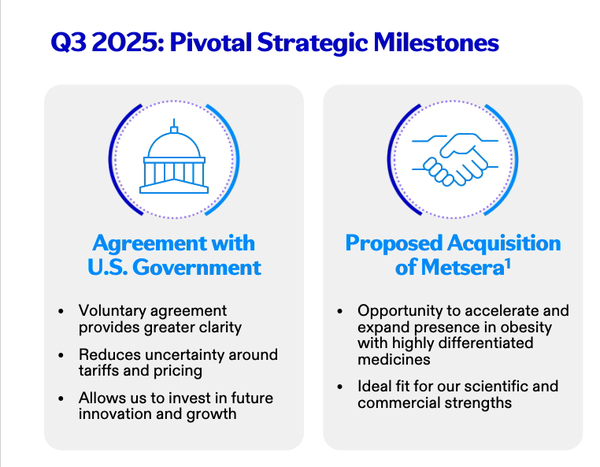
Pfizer’s battle with Novo
Nordisk over control of obesity drug developer Metsera is getting nasty.
After Pfizer apparently sealed a $4.9 billion purchase of Metsera in September, Novo Nordisk swooped in during
the past week to offer a higher price, upping the ante again Tuesday morning -- now up to $10 billion, per the Financial
Times.
Pfizer has in turn filed two separate lawsuits to block Novo Nordisk’s bid, essentially arguing that the latter’s purchase of Metsera -- by the company that already
makes Wegovy and Ozempic -- would be anticompetitive.
Also on Tuesday morning, Pfizer CEO Albert Bourla -- who last month became the first pharma exec to reach agreement with the
Trump administration on lowering drug prices in the U.S. -- specifically called out Novo Nordisk’s status as a non-U.S.-based company.
advertisement
advertisement
Speaking on a Q3 earnings call with analysts,
Bourla declared the recent moves by Danish-based Novo Nordisk “an illegal attempt by a foreign company to do an end-run around antitrust laws…What they want to achieve is not to get the
products, but to destroy them… to cut and kill an emerging competitor, which is a significant and distressing concern given Novo's dominant market position.”
On the surface,
stated TD Cowen analyst Steve Scala, Metsera’s data looks similar to other companies, “many other big cap pharmas have passed over Metsera when pursuing other products,” and
“nothing in all this justifies a bidding war or even a protracted legal battle.” So he asked Bourla, “Is Pfizer’s determination to persist underpinned by substantial
confidentiality data or simply the desire to be a player in obesity?...Could Pfizer just walk away?”
Metsera will provide Pfizer with competitive assets, Bourla replied, and Novo Nordisk
is engaged in “an effort to cut and kill this emerging competitor.…and to do that by evading regulatory scrutiny.”
Bourla, meanwhile, wouldn’t discuss details of
Pfizer’s agreement with the Trump administration, calling them confidential. He did refer to it as “an important milestone because it removed uncertainty on two critical policy fronts. We
successfully addressed the administration's call to lower prescription drug costs and align prices with those in other developed countries, and we will have a three-year grace period from certain US
tariffs with our commitment to further invest in manufacturing in the U.S.”
In Q3, Pfizer reported revenues of $16.7 billion, a 7% year-year-over decline, which CFO Dave Denton
attributed largely to lower rates of both COVID infections and COVID vaccinations, which caused sales declines in both its Paxlovid treatment and its Comirnaty vaccine.
Outside of the
COVID products, though, Denton says revenues rose 4% YoY. Primary contributors to the growth, which Bourla termed a “solid performance,” were blood thinner Eliquis (+22%),
Vyndaqel heart disease products (+7%) , and migraine drug Nurtec ODT (+22%). For the latter, Bourla noted that “our new consumer campaigns continue to perform well.”
Pfizer reaffirmed full-year 2025 guidance of
revenues between $61 billion and $64 billion, which Denton said “assumes that the COVID franchise continues a very modest uptake for the balance of this year, particularly in the U.S.”
Still, Pfizer’s push to enter what Bourla termed “the high growth therapeutic area of obesity” received the most attention from analysts on Tuesday. The drama will continue on
Wednesday as Novo Nordisk will announces its own Q3 results and talks to analysts.